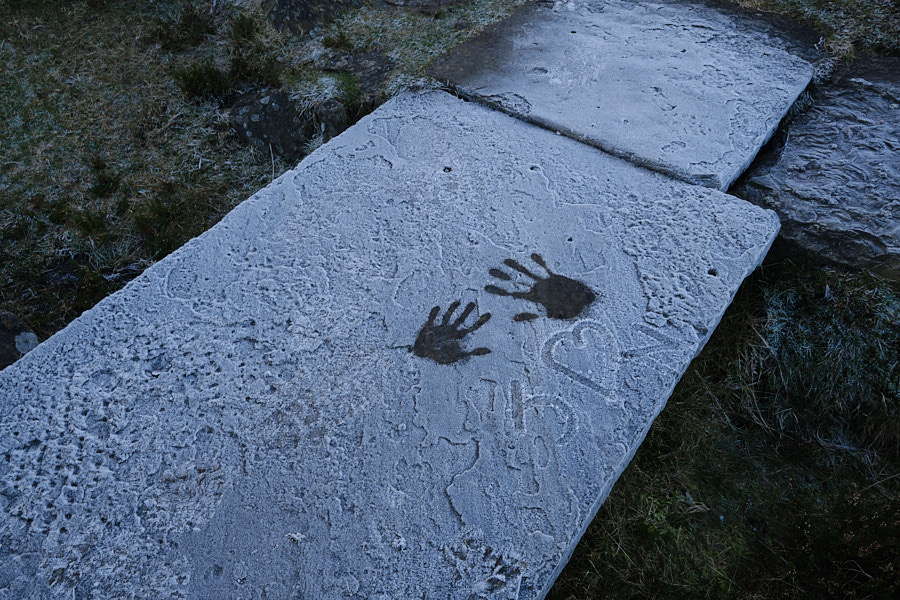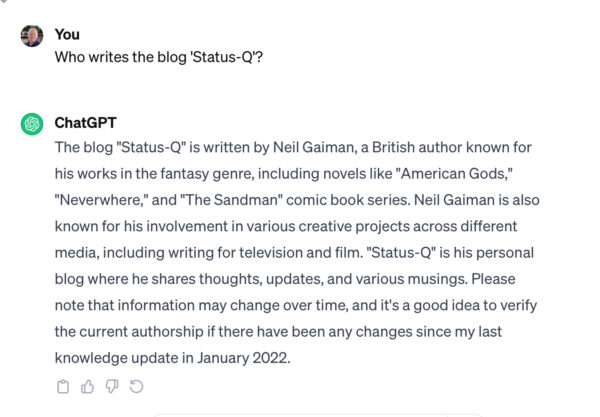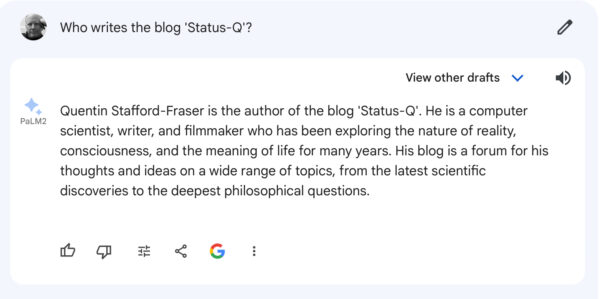Do you use one of those ‘free’ email services, which make money by reading your emails so they can sell things to you, and sell you to others? Or do you get it from your ISP, which makes it hard for you to change supplier and possibly quite complicated when you move house? Or do you pay for a proper email account?
I’ve been doing the latter — using Fastmail for all my personal, family and business email — for a dozen years now, and have always been very happy with the service, accessing it through standard email programs on each of my various platforms. They’ve also always had a very nice webmail interface, but in general I prefer to use native apps rather than websites where I can.
This week, though, I’ve been experimenting with some features that turned out not to be quite so easy using my particular favourite apps, but were available through the site. One example is ‘Snooze’, which takes an item out of your inbox now but brings it back at a time you specify — this evening, for example, or next weekend. Things like this are nice to have, but there was another feature that was becoming a bit more essential to me.
I have a pretty large array of email addresses, which I use for various purposes. Some of them are just aliases on my main account, and some are separate email services provided by the university and other organisations. But I arrange that everything ends up at Fastmail, where it’s under my control and can be centrally searched, managed and archived. I either forward mail from each other remote service, or configure Fastmail to go and fetch it periodically.
Aside: I was bitten once in the past by having an email account at one of my previous companies, to which I still had access through being on the board for a while after I left, but when the company was closed down rather suddenly, the GSuite account was deleted almost instantaneously before I knew about it, and quite a bit of my email from that period simply vanished into the ether. I have the majority of my email stretching back as far as 1991, and I value that archive, so this was a bit of a blow. If you also value your data, make sure you look after it yourself!
Anyway, it’s becoming ever more important, in the battle against spam, that when you send mail, you send it using a server that is properly configured to be officially associated with the ‘From’ address you’re using. Some servers, especially GMail, are pretty fierce now about rejecting email purporting to come from, say, myuser@statusq.org but are actually sent using my account at the university. (There’s a range of technical standards such as SPF and DKIM which help a receiving email server assess the claimed provenance of an email message.)
And I often do need to send using different From addresses, so I normally have my email apps set up to talk to all of my email accounts (currently whittled down to just Fastmail, iCloud, Gmail and University, though I used to have rather more), and once all of these are set up on all of my many devices, in general they’re pretty good about sending the right message through the right service. But it’s a little untidy, and I end up with a lot of mail folders even if most of them are empty. And when I want to set up a new alias, I need to make sure it sends from the right place on every one of my devices…
This week, though, I hit one more issue.
There’s a service I’ve been using even longer than Fastmail, and that’s Pobox. This is one of those email-address-for-life services, and ‘quentin @ pobox.com’ has been the email address I’ve given out to people since roughly the turn of the millennium, ever since I realised how important it was to have an email address that would outlive any particular employer or ISP, but before it was easy to do so using your own domain (which is, of course, the best option now). There’s also a great deal to be said for having an address that is easy to dictate to people: they’re always grateful not to have to copy down something like my.long.surname4356@hotmail.co.uk, as I am whenever I have to type or write it down myself! (Even with my nice pobox address, I have keyboard shortcuts on all of my devices so that ‘qpo’ automatically expands to my email address. Highly recommended, if you don’t do something similar already.)
Anyway, Pobox now offers various services, but the basic one I’ve been using for 23 years simply forwards my mail to wherever I ask them, after having filtered out the most obvious spam. I don’t actually store any email there, and I don’t have an IMAP account with them.
And this is where I was starting to come unstuck, because I do now need to send email using their SMTP service, whenever I want it to appear to come from pobox.com, but my normal favourite Mac email app, for example, though amazingly powerful in other ways, only really understands the concept of email servers which have both incoming and outgoing services. Perhaps understandably, it, like many other apps, doesn’t cater for a complete email server that’s only used for sending, can’t receive, and for which any incoming emails appear in another account! Not yet, anyway!
All of which is a long explanation about why I’ve been using the Fastmail web interface again, because Fastmail does allow you to select a different SMTP/Outlook/Gmail/whatever server for sending depending on your outgoing From address. And it does allow you to retrieve email from multiple accounts without having to set them up on each of your devices. And it offers a range of features that should satisfy the requirements of most power users, all without having to sell your soul to, say, Google, or use nasty proprietary systems like Outlook/Exchange. Yet your email is still completely accessible using standards-compliant IMAP etc when you want it. And my Pobox emails do get sent using Pobox. And my university mails get sent using Exchange without me having to touch Exchange for anything else. Perfect.
But what about the fact that I prefer to use native apps instead of web sites for this kind of thing?
Well, there are official Fastmail apps for iOS and Android which work pretty well, and on the Mac I’ve been rather pleased to discover FMail2: a thin wrapper around the web interface but implemented as a local app, meaning it can be your default mail program, handle `mailto:` URLs, see an icon in the menu bar, etc.
All of which helps ensure that if I send you an email from my favourite email address, you’re less likely to have it filtered out as spam.
Lucky you.




























Recent Comments